Peareth Surname Ancestry ResultsOur indexes 1000-1999 include entries for the spelling 'peareth'. In the period you have requested, we have the following 34 records (displaying 21 to 30): Single Surname Subscription | | | Buying all 34 results of this search individually would cost £168.00. But you can have free access to all 34 records for a year, to view, to save and print, for £100. Save £68.00. More... |
These sample scans are from the original record. You will get scans of the full pages or articles where the surname you searched for has been found. Your web browser may prevent the sample windows from opening; in this case please change your browser settings to allow pop-up windows from this site. Boys entering Wellington College in Berkshire
(1878)
Wellington College, near Wokingham, was originally founded for the education of sons of military officers. A register of boys entering the school from First Term 1859 to Michaelmas 1933 was compiled by F. G. Lawrence for the Old Wellingtonian Society. In each entry the boy's name is given in full, in bold, surname first; age at entry (usually 11 to 14); then, in brackets, the name of the dormitory or house to which he belonged, in italics, with the years of his stay; then his father's name (usually surname and initials, but not christian name) with military decorations where appropriate. School prefects and captains are noted as such; if the boy played cricket for the school, XI with the years; academic honours, scholarships, &c.; a brief biography; and date of death, or (where known) address in 1933. Year of marriage is given, and sometimes the wife's name and/or her father's name. Clearly, those boys who kept contact with the school and/or had distinguished military careers have detailed entries; others disappeared into oblivion on leaving.PEARETH. Cost: £6.00.  | Sample scan, click to enlarge
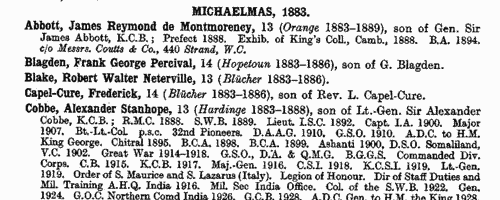
| Boys entering Wellington College in Berkshire
(1880)
Wellington College, near Wokingham, was originally founded for the education of sons of military officers. A register of boys entering the school from First Term 1859 to Michaelmas 1933 was compiled by F. G. Lawrence for the Old Wellingtonian Society. In each entry the boy's name is given in full, in bold, surname first; age at entry (usually 11 to 14); then, in brackets, the name of the dormitory or house to which he belonged, in italics, with the years of his stay; then his father's name (usually surname and initials, but not christian name) with military decorations where appropriate. School prefects and captains are noted as such; if the boy played cricket for the school, XI with the years; academic honours, scholarships, &c.; a brief biography; and date of death, or (where known) address in 1933. Year of marriage is given, and sometimes the wife's name and/or her father's name. Clearly, those boys who kept contact with the school and/or had distinguished military careers have detailed entries; others disappeared into oblivion on leaving.PEARETH. Cost: £6.00.  | Sample scan, click to enlarge
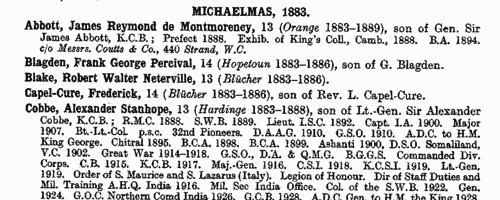
| Debtors, Insolvents and Bankrupts
(1886)
Bills of sale (binding assets to a creditor/lender), insolvencies and bankruptcies in England and Wales, July to September 1886PEARETH. Cost: £6.00.  | Sample scan, click to enlarge

| Classics students at Cambridge University
(1890)
Tripos lists or examination results for the year, arranged by class (First, Second and Third), and within each class in order of score in the examination (students getting exactly equal marks are bracketed together). Each student's surname and college is given. The course was divided into parts I and II, with separate examinations, and the results into First Class (split into Divisions 1, 2, 3); Second Class (split into Divisions 1, 2, 3); and Third Class (split into Divisions 1, 2, 3), but the examinants listed purely alphabetically within each division. In the lists for Part II, those students gaining firsts are further annotated with the letters b, c, d or e, denoting the section or sections for which they were awarded first class honours. The letter a indicates that the candidate had also attained a first class standard in section A. An asterisk next to any of these letters indicates special distinction. Women students are listed separately, but on the same basis. These lists are particularly useful in identifying for an individual the fellow-students who will have attended lectures with him; and, where from the college, are likely to have been even more closely associated by having been under the same supervisor. (The sample scan is from the start of the Mathematics Tripos list for 1770)PEARETH. Cost: £6.00.  | Sample scan, click to enlarge

| Associates of King's College, London
(1896)
Former students of King's College, London, could be elected as associates of the college, and then enjoyed the privilege of perpetual free admission to all the classes in the department from which they had been elected; the use of the libraries and museums on the same basis as current students; and admission to dine at high table in the college hall. This list of associates from the college calendar for 1896-1897 gives year of election, full name (surname first), and the faculty or department in which graduated, of all associates elected from 1866 to 1896.PEARETH. Cost: £4.00.  | Sample scan, click to enlarge

| Boys entering Haileybury College, Hertfordshire
(1897)
Haileybury College, near Hertford, was founded by the East India Company in 1806, and incorporated by Royal Charter in 1864. This register of pupils entering the school from 1862 to 1931 was edited by a master there, Laurence Arthur Speakman. The boys are listed by term of joining the school, and then alphabetically by name (in bold), surname first (in capitals). There is then usually a precise birthdate, and the name and address of his father; his period at the school, starting with abbreviations to indicate the house to which he belonged (B., Batten; B. F., Bartle Frere; C., Colvin; E., Edmonstone; Ha., Hailey; Hi., Highfield; L., Lawrence; Le B., Le Bas; M., Melvill; Th., Thomason; T., Trevelyan), and the first and last forms attended (e. g., IV., fourth form). Where a member of a school team there is then an indication (e. g., XI., cricket). For some pupils, with whom the school had lost touch, Speakman was only able to record the details of their time at Haileybury; but for most a brief career synopsis is then given, and current address (as in 1931) or date of death.
PEARETH. Cost: £4.00.  | Sample scan, click to enlarge
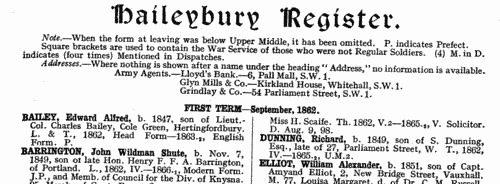
| Merchants and traders in Newcastle-upon-Tyne
(1515-1898)
The society of Merchant Adventurers of Newcastle-upon-Tyne consisted of those who had obtained freedom of the city (allowing them to trade there) by birth as a son of, or apprenticeship, to a freeman: and within that, freedom of one of the three 'trades', i. e. boothman, draper or mercer. F. W. Dendy prepared extracts from the merchant adventurers' records, the second volume, published by the Surtees Society in 1899 containing extracts from the minute books relating to the history of the merchants' court, an account of the long-standing dispute between the Newcastle company and the London company, some extracts relating to the relations between the Newcastle company and the Eastland Company (who had a monopoly of the trade with Russia and the Baltic), copies of the oaths used by the Newcastle company, the London company and the Eastland Company, and (pages 185 to 381) a list of the apprentices enrolled in, and of the freemen admitted to, the Newcastle company. This list is arranged in a table of seven columns: Name of Apprentice; Name of Father of Apprentice and Observations (particularly, instances where an apprentice is passed over to a new master during his apprenticeship); Master; Boothman (B.), Draper (D.) or Mercer (M.); Date of Indentures: Enrolment: Admission. All the dates are normalised to New Style, i. e. to the modern calendar. Finally, there is a list of sons and apprentices of members who, having thus acquired the right of freedom of the city, took up the freedom, but did not assume the freedom of any of the three trades. The index covers all the contents of the volume, not just the apprentice and freemen lists.PEARETH. Cost: £4.00.  | Sample scan, click to enlarge

| Boys entering Wellington College in Berkshire
(1901)
Wellington College, near Wokingham, was originally founded for the education of sons of military officers. A register of boys entering the school from First Term 1859 to Michaelmas 1933 was compiled by F. G. Lawrence for the Old Wellingtonian Society. In each entry the boy's name is given in full, in bold, surname first; age at entry (usually 11 to 14); then, in brackets, the name of the dormitory or house to which he belonged, in italics, with the years of his stay; then his father's name (usually surname and initials, but not christian name) with military decorations where appropriate. School prefects and captains are noted as such; if the boy played cricket for the school, XI with the years; academic honours, scholarships, &c.; a brief biography; and date of death, or (where known) address in 1933. Year of marriage is given, and sometimes the wife's name and/or her father's name. Clearly, those boys who kept contact with the school and/or had distinguished military careers have detailed entries; others disappeared into oblivion on leaving.PEARETH. Cost: £6.00.  | Sample scan, click to enlarge

| Anglican clergy
(1930)
Crockford's Clerical Directory listed all Anglican clergy in the British Isles, India, the colonies, Europe, Asia and South America. The 59th annual issue, for 1930, is based on returns from all the individuals listed. The details given are: name (surname first, in capitals) in bold, prefixed by an asterisk in the case of university electors, and by a dagger whether the return had not been made, or it had been imperfectly filled up; name of theological college and/or university, and degrees, with years; a bold d followed by year and diocese signifies date of ordination as deacon and by which bishop; then a bold p, similarly for ordination as priest; posts (C: curate; I: incumbent; V; vicar; R: rector) with parishes and years; address; telephone number; and lists of books &c. where appropriate. In the case of the man then holding an English, Irish, Scottish or Welsh benefice, additional details are given - a bold P signifies the patron of the advowson; then the income, with items such as Q. A. B. (Queen Anne's Bounty), Eccles(iastical) Comm(issioners), Fees, e. o. (Easter Offerings), Pew Rents, T(ithe) R(ent) C(harge), Gl(ebe), &c.PEARETH. Cost: £4.00.  | Sample scan, click to enlarge
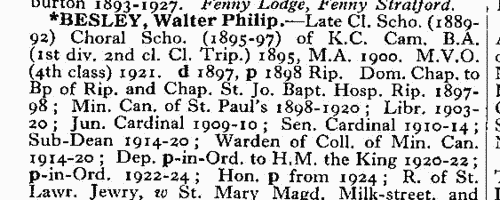
| Members of Oxford University: Men
(1931)
The Oxford University Calendar for 1931 includes this list of all living members of the university, i. e. not only undergraduates and members of staff, but also all surviving graduates from earlier generations. The names are arranged alphabetically by surname, then by college in order of foundation. Surnames are given, initials, highest degree, name of college, and then the year of graduating the first degree. For undergraduates only name and college is given. An asterisk before a surname indicates a member on the foundation of the college. There are separate lists for men and women.PEARETH. Cost: £4.00.  | Sample scan, click to enlarge
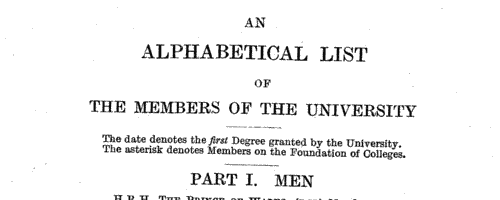
|
Research your ancestry, family history, genealogy and one-name study by direct access to original records and archives indexed by surname.
|












